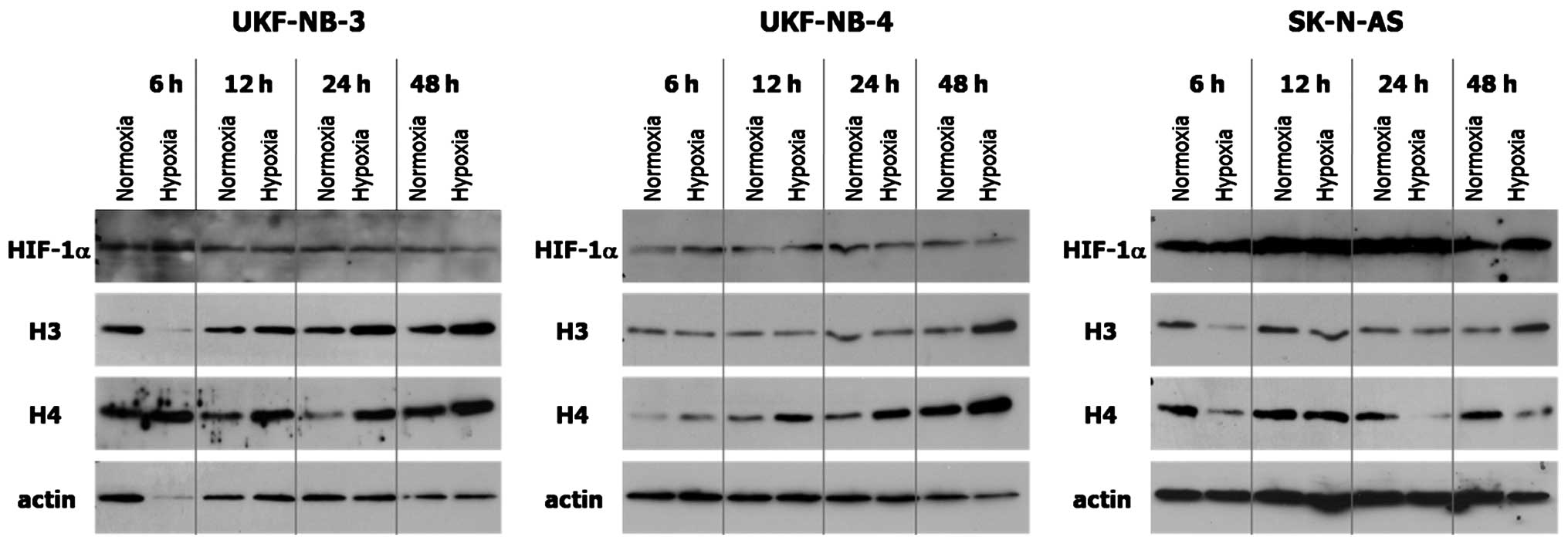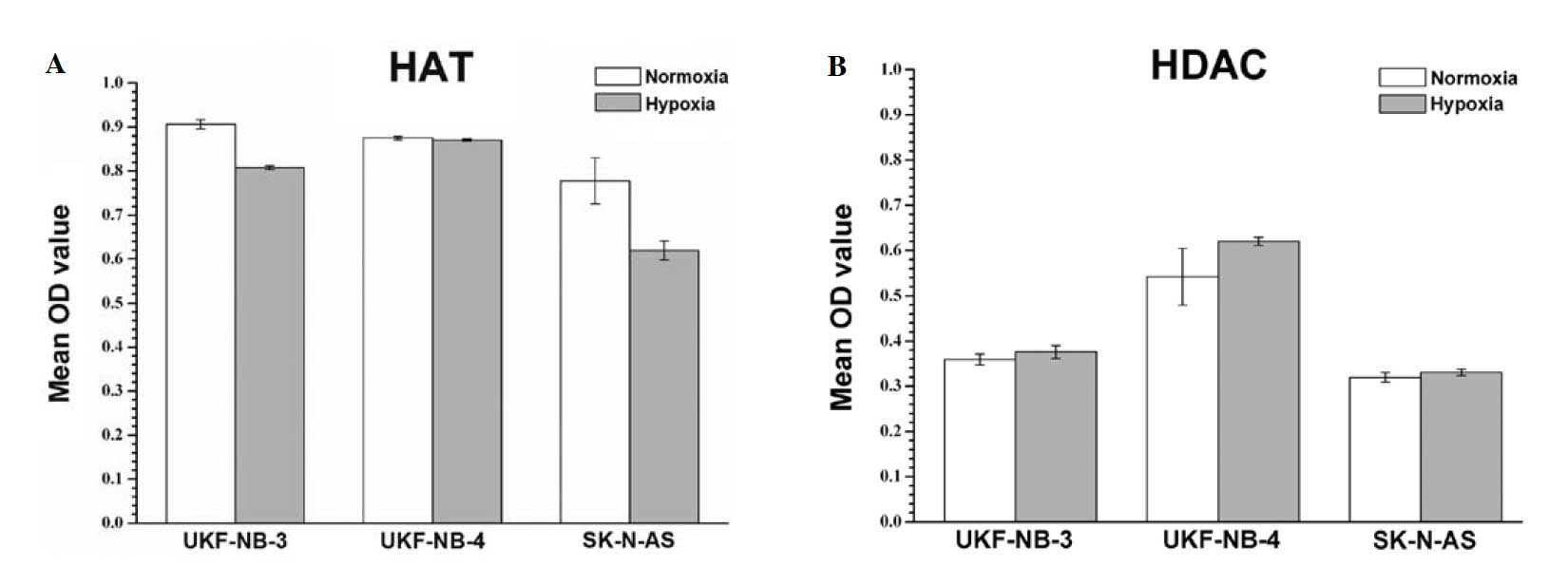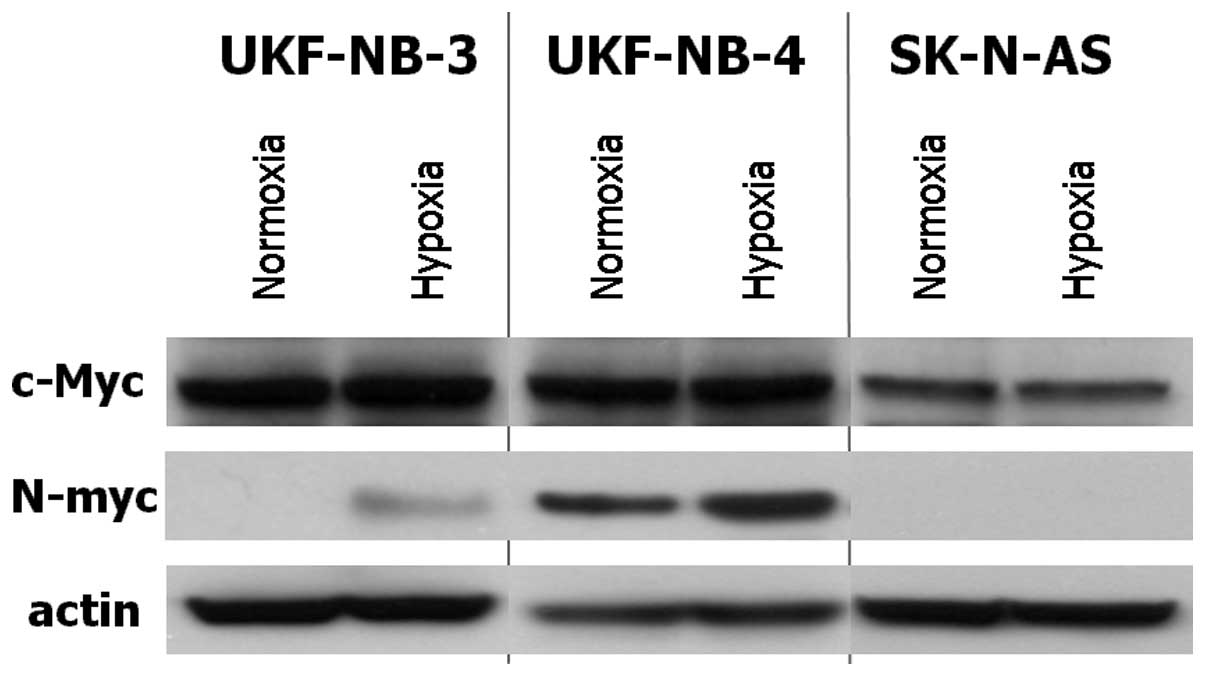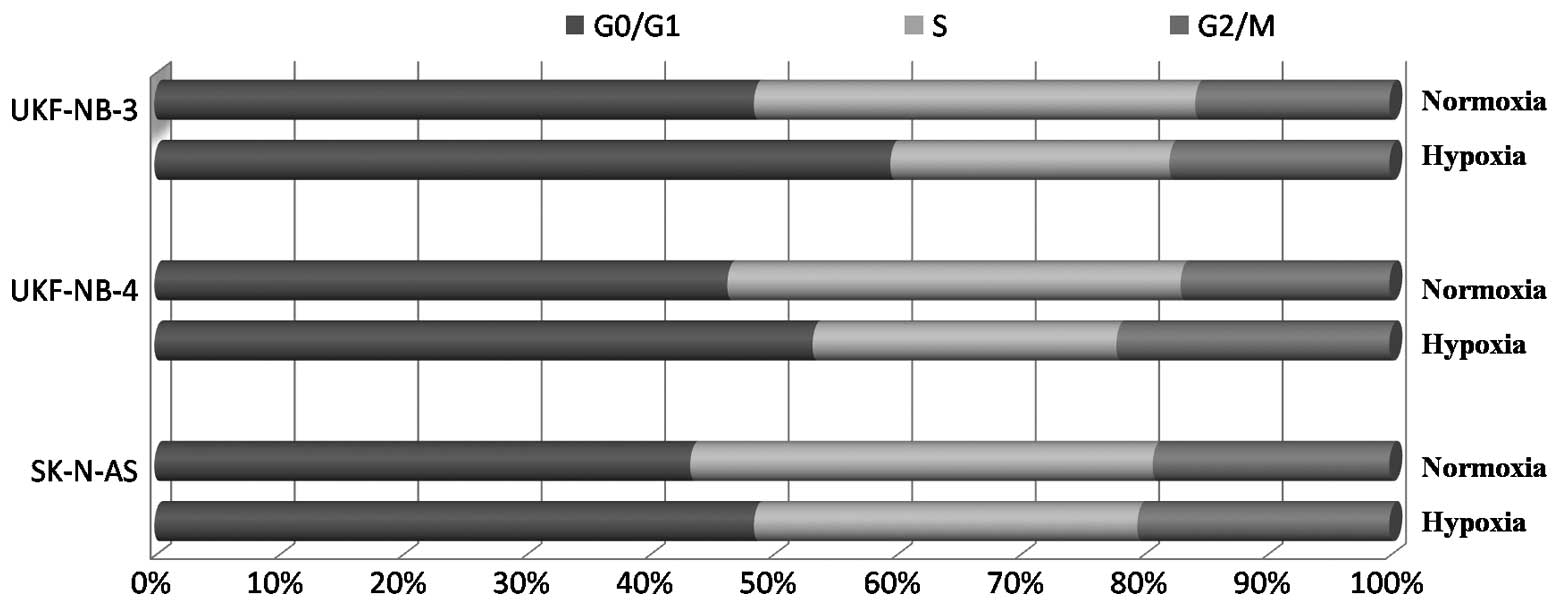|
1
|
Maris JM and Matthay KK: Molecular biology
of neuroblastoma. J Clin Oncol. 17:2264–2279. 1999.PubMed/NCBI
|
|
2
|
Morgenstern BZ, Krivoshik AP, Rodriguez V
and Anderson PM: Wilms’ tumor and neuroblastoma. Acta Paediatr
Suppl. 93:78–85. 2004.
|
|
3
|
Brodeur GM: Neuroblastoma: biological
insights into a clinical enigma. Nat Rev Cancer. 3:203–216. 2003.
View Article : Google Scholar : PubMed/NCBI
|
|
4
|
Tang XX, Zhao H, Kung B, Kim DY, Hicks SL,
Cohn SL, Cheung NK, Seeger RC, Evans AE and Ikegaki N: The
MYCN enigma: significance of MYCN expression in
neuroblastoma. Cancer Res. 66:2826–2833. 2006.PubMed/NCBI
|
|
5
|
Lutz W and Schwab M: In vivo regulation of
single copy and amplified N-myc in human neuroblastoma
cells. Oncogene. 15:303–315. 1997. View Article : Google Scholar : PubMed/NCBI
|
|
6
|
Westermann F, Muth D, Benner A, Bauer T,
Henrich KO, Oberthuer A, Brors B, Beissbarth T, Vandesompele J,
Pattyn F, Hero B, König R, Fischer M and Schwab M: Distinct
transcriptional MYCN/c-MYC activities are associated with
spontaneous regression or malignant progression in neuroblastomas.
Genome Biol. 9:R1502008. View Article : Google Scholar : PubMed/NCBI
|
|
7
|
Fulda S, Lutz W, Schwab M and Debatin KM:
MycN sensitizes neuroblastoma cells for drug-induced apoptosis.
Oncogene. 18:1479–1486. 1999. View Article : Google Scholar : PubMed/NCBI
|
|
8
|
Porro A, Haber M, Diolaiti D, Iraci N,
Henderson M, Gherardi S, Valli E, Munoz MA, Xue C, Flemming C,
Schwab M, Wong JH, Marshall GM, Della Valle G, Norris MD and Perini
G: Direct and coordinate regulation of ATP-binding cassette
transporter genes by Myc factors generates specific transcription
signatures that significantly affect the chemoresistance phenotype
of cancer cells. J Biol Chem. 285:19532–19543. 2010. View Article : Google Scholar
|
|
9
|
Harris AL: Hypoxia - a key regulatory
factor in tumour growth. Nat Rev Cancer. 2:38–47. 2002. View Article : Google Scholar : PubMed/NCBI
|
|
10
|
Höckel M and Vaupel P: Tumor hypoxia:
definitions and current clinical, biologic, and molecular aspects.
J Natl Cancer Inst. 93:266–276. 2001.PubMed/NCBI
|
|
11
|
Furchert SE, Lanvers-Kaminsky C, Juürgens
H, Jung M, Loidl A and Frühwald MC: Inhibitors of histone
deacetylases as potential therapeutic tools for high-risk embryonal
tumors of the nervous system of childhood. Int J Cancer.
120:1787–1794. 2007. View Article : Google Scholar : PubMed/NCBI
|
|
12
|
Decock A, Ongenaert M, Vandesompele J and
Speleman F: Neuroblastoma epigenetics: from candidate gene
approaches to genome-wide screenings. Epigenetics. 6:962–970. 2011.
View Article : Google Scholar : PubMed/NCBI
|
|
13
|
Santini V, Gozzini A and Ferrari G:
Histone deacetylase inhibitors: molecular and biological activity
as a premise to clinical application. Curr Drug Metab. 8:383–393.
2007. View Article : Google Scholar : PubMed/NCBI
|
|
14
|
Portela A and Esteller M: Epigenetic
modifications and human disease. Nat Biotechnol. 28:1057–1068.
2010. View
Article : Google Scholar : PubMed/NCBI
|
|
15
|
Kouzarides T: Chromatin modifications and
their function. Cell. 128:693–705. 2007. View Article : Google Scholar : PubMed/NCBI
|
|
16
|
Watson JA, Watson CJ, McCrohan AM,
Woodfine K, Tosetto M, McDaid J, Gallagher E, Betts D, Baugh J,
O’Sullivan J, Murrell A, Watson RW and McCann A: Generation of an
epigenetic signature by chronic hypoxia in prostate cells. Hum Mol
Genet. 8:3594–3604. 2009. View Article : Google Scholar : PubMed/NCBI
|
|
17
|
Frank SR, Schroeder M, Fernandez P,
Taubert S and Amati B: Binding of c-Myc to chromatin mediates
mitogen-induced acetylation of histone H4 and gene activation.
Genes Dev. 15:2069–2082. 2001. View Article : Google Scholar : PubMed/NCBI
|
|
18
|
Frank SR, Parisi T, Taubert S, Fernandez
P, Fuchs M, Chan HM, Livingston DM and Amati B: MYC recruits the
TIP60 histone acetyltransferase complex to chromatin. EMBO Rep.
4:575–580. 2003. View Article : Google Scholar : PubMed/NCBI
|
|
19
|
Li Q and Costa M: c-Myc mediates a
hypoxia-induced decrease in acetylated histone H4. Biochimie.
91:1307–1310. 2009. View Article : Google Scholar : PubMed/NCBI
|
|
20
|
Stiborová M, Martínek V, Rýdlová H, Hodek
P and Frei E: Sudan I is a potential carcinogen for humans:
evidence for its metabolic activation and detoxication by human
recombinant cytochrome P450 1A1 and liver microsomes. Cancer Res.
62:5678–5684. 2002.
|
|
21
|
Poljaková J, Eckschlager T, Kizek R, Frei
E and Stiborová M: Electrochemical determination of enzymes
metabolizing ellipticine in thyroid cancer cells - a tool to
explain the mechanism of ellipticine toxicity to these cells. Int J
Electrochem Sci. 8:1573–1585. 2013.
|
|
22
|
Gut P and Verdin E: The nexus of chromatin
regulation and intermediary metabolism. Nature. 502:489–498. 2013.
View Article : Google Scholar : PubMed/NCBI
|
|
23
|
Buechner J and Einvik C: N-myc and
noncoding RNAs in neuroblastoma. Mol Cancer Res. 10:1243–1253.
2012. View Article : Google Scholar : PubMed/NCBI
|
|
24
|
Huang R, Cheung NK, Vider J, Cheung IY,
Gerald WL, Tickoo SK, Holland EC and Blasberg RG: MYCN and MYC
regulate tumor proliferation and tumorigenesis directly through
BMI1 in human neuroblastomas. FASEB J. 25:4138–4149. 2011.
View Article : Google Scholar : PubMed/NCBI
|
|
25
|
Liu XH, Yu EZ, Li YY and Kagan E: HIF-1α
has an anti-apoptotic effect in human airway epithelium that is
mediated via Mcl-1 gene expression. J Cell Biochem. 97:755–765.
2006.
|
|
26
|
Wang GL, Jiang BH, Rue EA and Semenza GL:
Hypoxia-inducible factor 1 is a basic-helix-loop-helix-PAS
heterodimer regulated by cellular O2 tension. Proc Natl
Acad Sci USA. 92:5510–5514. 1995. View Article : Google Scholar : PubMed/NCBI
|
|
27
|
Adamski J, Price A, Dive C and Makin G:
Hypoxia-induced cytotoxic drug resistance in osteosarcoma is
independent of HIF-1Alpha. PloS One. 8:e653042013. View Article : Google Scholar : PubMed/NCBI
|
|
28
|
Zhong H, De Marzo AM, Laughner E, Lim M,
Hilton DA, Zagzag D, Buechler P, Isaacs WB, Semenza GL and Simons
JW: Overexpression of hypoxia inducible factor 1α in common human
cancers and their metastases. Cancer Res. 59:5830–5835. 1999.
|
|
29
|
Talks KL, Turley H, Gatter KC, Maxwell PH,
Pugh CW, Ratcliffe PJ and Harris AL: The expression and
distribution of the hypoxia-inducible factors HIF-1α and HIF-2α in
normal human tissues, cancers, and tumor associated macrophages. Am
J Pathol. 157:411–421. 2000.
|
|
30
|
Kwon HJ, Kim MS, Kim MJ, Nakajima H and
Kim KW: Histone deacetylase inhibitor FK228 inhibits tumor
angiogenesis. Int J Cancer. 97:290–296. 2002. View Article : Google Scholar : PubMed/NCBI
|
|
31
|
Hubbi ME, Kshitiz, Gilkes DM, Rey S, Wong
CC, Luo W, Kim DH, Dang CV, Levchenko A and Semenza GL: A
nontranscriptional role for HIF-1α as a direct inhibitor of DNA
replication. Sci Signal. 6:ra102013.
|
|
32
|
Bedrnicek J, Vicha A, Jarosova M,
Holzerova M, Cinatl J Jr, Michaelis M, Cinatl J and Eckschlager T:
Characterization of drug-resistant neuroblastoma cell lines by
comparative genomic hybridization. Neoplasma. 52:415–419.
2005.PubMed/NCBI
|
|
33
|
Poljakova J, Hrebackova J, Dvorakova M,
Moserova M, Eckschlager T, Hrabeta J, Göttlicherova M, Kopejtkova
B, Frei E, Kizek R and Stiborova M: Anticancer agent ellipticine
combined with histone deacetylase inhibitors, valproic acid and
trichostatin A, is an effective DNA damage strategy in human
neuroblastoma. Neuro Endocrinol Lett. 32(Suppl 1): 101–116.
2011.
|


















